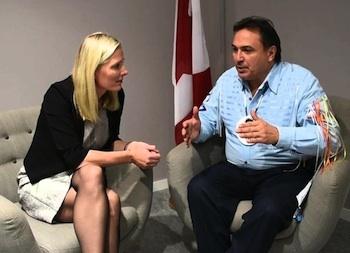Image Caption
By Shari Narine
Windspeaker Contributor
NIAGARA FALLS
Consultation with Indigenous groups and peoples will get underway in September as the Liberal government begins a comprehensive review of federal environmental assessment processes.
“We need you to contribute your knowledge. We need you to contribute your ideas. We need you to help build better environmental assessment processes,” said Environment and Climate Change Minister Catherine McKenna.
McKenna addressed chiefs and delegates July 13 at the Assembly of First Nations’ annual general assembly. She said it was the first time in more than 10 years that a federal environment minister had attended an AFN general assembly. National Chief Perry Bellegarde said it was the first time ever.
The review McKenna announced will include the Canadian Environmental Assessment Act, National Energy Board, the Fisheries Act and Navigable Waters Act. Funding for Indigenous involvement will be provided.
“Indigenous consultation is an integral part of environmental assessments,” said McKenna.
She stressed the need for a strong, respectful partnership between the government and Indigenous peoples, noting that over the past decade the previous government had done little to gain that trust. She said her government would continue to work hard to change that.
McKenna said that traditional Indigenous knowledge and the observations of those who live off the land will play an important role in informing the government in the actions that need to be taken to address climate change.
“The health of the environment is challenged as never before with climate change. It really is the challenge of our generation. Our job is to work together to find and implement solutions … (for) a safe and healthy country and one where the land, the sea, the plants and animals are all respected,” she said.
She acknowledged that Indigenous people – particularly those living in the north – were the first to feel the impact of climate change.
“For too long governments did not listen to the warnings from Elders,” she said. “All these changes tell us, without a shadow of a doubt, that we must act now…..We have to find solutions that are built on an understanding of the real impacts of climate change and that means a greater collaboration with First Nations.”
McKenna said her government would continue to involve Indigenous people in the climate change discussion, including at the international level.
“I’m extremely proud that Indigenous leaders were part of our delegation to the Paris climate negotiations,” she said. She added that one of her “greatest accomplishments” was to have included in the Paris agreement references to Indigenous people, their rights and their traditional knowledge.
McKenna’s work did not go unacknowledged, as she was blanketed by AFN environment portfolio holders Chief Bill Erasmus, Chief Kevin Hart and Chief Isadore Day.
“In COP 21 in Paris, (McKenna) worked so tirelessly,” said Bellegarde. “We are blanketing her. We all know the importance of blanketing. It’s been smudged. It’s there to represent love, warmth, strength, protection.”
Bellegarde said First Nations were preparing for further involvement in COP 22 to be held in Morocco next year.

